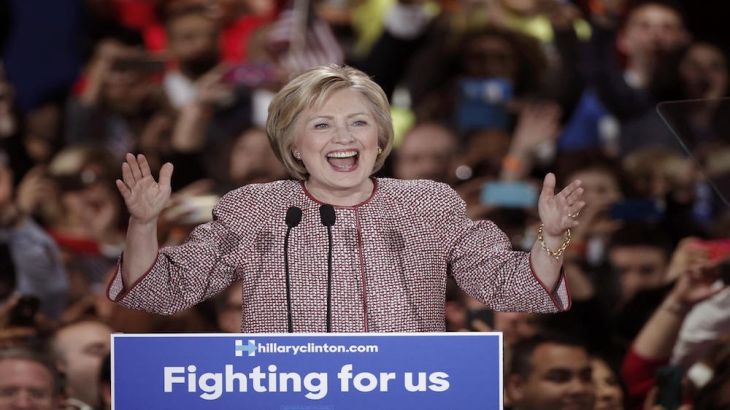
New York: Primaries, politics and the press
Trump and Clinton won in NYC, but what part did the media play in their victories? Plus, the battle against ad blockers.
Throughout the US primary season we have seen plenty of examples of the American news media not only reporting political developments in the race for the White House but playing a central role in them – especially when it comes to the number of hours given over to Republican candidate, Donald Trump, or the tone of inevitability when it comes to the coverage of Democratic candidate, Hillary Clinton.
The media’s preoccupation with Trump is not necessarily ideologically driven – rather it’s economic because in the cable news industry, he guarantees ratings.
Keep reading
list of 4 itemsBisan Owda and AJ+ win Peabody Award for Gaza war coverage
Wall Street Journal cuts Hong Kong staff, shifts focus to Singapore
Abu Dhabi-backed group ends bid to take over Telegraph newspaper
On the Democratic side, much time – at least at the outset – was dedicated to Clinton, as opposed to her adversary, Bernie Sanders. Some say that unlike Trump, that’s not because of ratings, but rather what she represents in terms of the US political establishment, as well as bringing the tacit approval of Wall Street and corporate backers – some of whom own news channels that produce that coverage.
And this week, when Hillary Clinton clinched that crucial victory in the New York primary, the mainstream media narrative of her inevitability, her ‘electability’, was back.
Talking us through the story are: Sabrina Siddiqui, political reporter, The Guardian US; Robert McChesney, University of Illinois; Adam Johnson, journalist, Alternet; and Nikki Usher, George Washington University’s School Of Media And Public Affairs.
Other stories on our radar this week: In Bangladesh, two newspaper editors stand accused of plotting to kill the prime minister’s son; the Turkish government – having already gone after voices on the German airwaves – turned its attention to the Russian media; and Twitter has appointed its first-ever managing director in China, and her resume has raised concerns among Chinese activists.
The battle against ad blockers
Advertising has always been a core part of the news business and its importance to the industry has only grown with the advent of the internet. We don’t opt in – online ads just happen.
But there are ways to opt out. They’re called ad blockers, pieces of software that make ads magically disappear from web pages and prevent marketers from walking in your digital footprint. When ad blockers started appearing more than six years ago, no one was paying much attention – the user base was limited to a tech-savvy audience. But that user number now exceeds 200 million – which poses an existential threat to online news outlets and their economic viability.
The Listening Post’s Paolo Ganino reports on the rise of ad blockers and what they mean to the news business.
Finally, ad blockers are just one of the issues news outlets are currently battling in their effort to survive. The news business is a bit like a carousel. Round and round it goes – once per 24-hour news cycle – but when the ride ends, news outlets often find themselves in the same place, with no profits to show for their work.
We asked our animator in New York, Beini Huang, to capture and caricature the struggles of those who are still trying to climb on the carousel and make a go of it in the news business in the digital age.